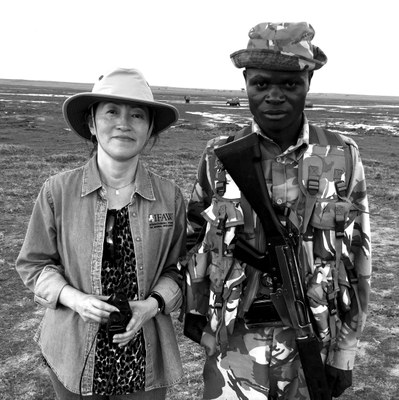Grace Gabriel: International Women’s Day CWT Spotlight
How did you start working in Counter Wildlife Trafficking (CWT)?
It was December 1996. While working at a TV station in the US, I returned to China to film an IFAW project—the opening of a sanctuary in southern China for eight Asiatic black bears rescued from the horrendously cruel bear bile farms. Years of confinement in tiny cages with a catheter surgically implanted into their gall bladder to extract bile left the bears with both physical and mental damage. One bear in particular touched me. Every time he put his paw onto the grass, he jerked back as if getting electrocuted. After being on concrete floor for most of his life, he found the softness of the grass and the fragrance of the soil alien. That moment changed my life forever. I quit my job in TV and returned to China to open an IFAW office. That bear’s first step to freedom turned me from an observer to an actor in CWT.
What is your proudest moment in CWT?
I have a proudest moment in each of the key stages in CWT, from changing policy to enhancing enforcement to reducing consumer demand.
- In December 2011, an IFAW tip off led to the Chinese government banning the auction of elephant ivory, rhino horn and tiger bone. That ban resulted in a 90% reduction in ivory auctions in mainland China. That reduction positively correlated with CITES PIKE data, showing African elephant poaching had declined since 2012.
- IFAW facilitated law enforcement training between China and Vietnam in September 2018 and May 2019 resulted in joint large seizures of wildlife in Vietnam within a month after the training. China Customs authorities credited the impact to enhanced cross-country intelligence sharing as a result of the training.
- IFAW’s Mom I have teeth campaign sensitizing Chinese to the links between ivory trade and elephant killing resonated with the public so much so that an ivory carver put down his knife; an ivory trader blew the whistle about the illegal trade to the media; and an educator put the campaign ad into China’s college entrance exam as a language question, subsequently reaching 9 million college applicants. In four years, the campaign penetrated 75% of urban China and reduced the propensity among the group most likely to purchase ivory from 54% to 26%.
As a woman in CWT, how do you think we can bolster women in Counter Wildlife Trafficking? And how can we ensure greater roles for women in CWT?
Use our own example and our positions within our own organizations to nurture, encourage, motivate, cultivate and attract female talents to CWT. IFAW office in China for example are 85% women.


